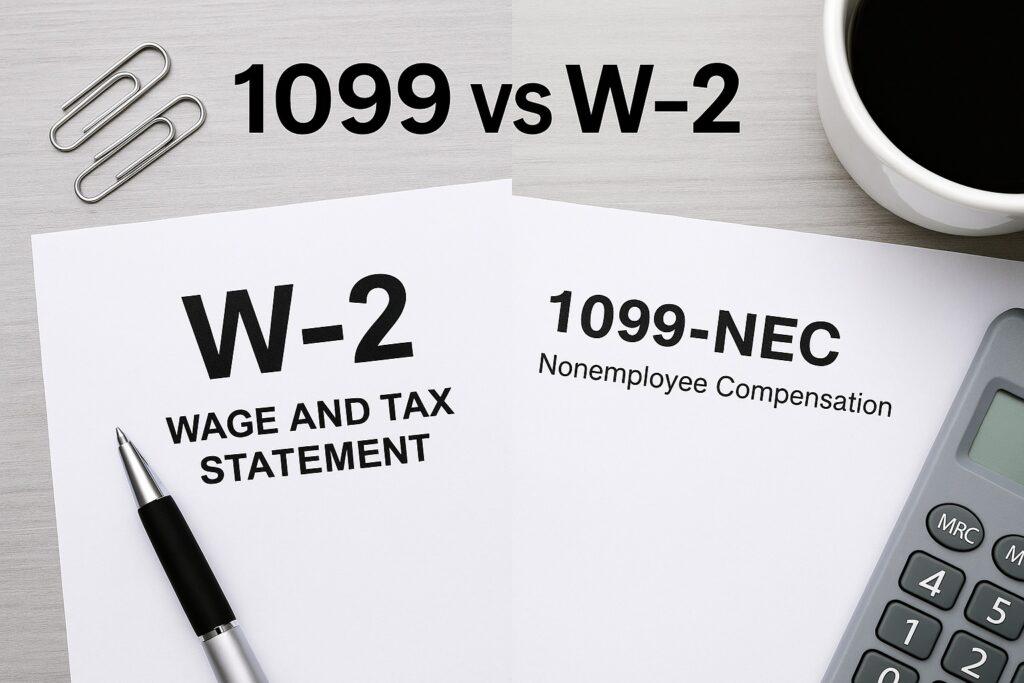
1099 vs W-2
1099 vs W‑2: What’s the Difference and How Does It Affect Your Taxes?
When tax season comes around, one of the most common questions is: What’s the difference between 1099 and W‑2? Whether you’re earning income, hiring help, or just trying to file your taxes correctly, understanding 1099 vs W‑2 is crucial. In this guide, we’ll explain what these classifications mean, how they affect your taxes in 2025, and what you need to know to stay compliant and avoid costly mistakes.
What Does 1099 vs W‑2 Mean?
The terms 1099 vs W‑2 refer to two different ways of classifying workers and reporting income. A W‑2 employee works directly for an employer, while a 1099 contractor is an independent worker or freelancer who provides services to clients. The IRS treats these roles very differently when it comes to taxes, reporting, and deductions.
What Is a W‑2 Employee?
When you’re classified as a W‑2 employee, you receive a regular paycheck with taxes already withheld. At the end of the year, your employer provides you with a Form W‑2 summarizing your earnings and the taxes paid on your behalf. Here’s what defines a W‑2 employee:
- Your employer withholds federal income tax, Social Security, and Medicare taxes.
- Your employer pays half of your Social Security and Medicare taxes (FICA).
- You may also receive benefits like health insurance, retirement contributions, and paid time off.
- You typically work a set schedule and follow the employer’s directions.
For tax purposes, W‑2 employees have straightforward filings, and the employer takes care of much of the paperwork.
What Is a 1099 Contractor?
On the other hand, 1099 contractors (sometimes called freelancers or independent contractors) work for themselves and provide services to businesses or clients. The company paying you does not withhold any taxes. Instead, you’re responsible for reporting and paying all your taxes. You’ll receive a Form 1099‑NEC from each client who paid you at least $600 during the year.
Here are the characteristics of a 1099 contractor:
- You are considered self-employed for tax purposes.
- You pay both the employer and employee portions of Social Security and Medicare (self-employment tax).
- You receive full payment with no taxes withheld.
- You’re responsible for estimated quarterly tax payments.
- You typically have more flexibility and control over how you perform your work.
1099 vs W‑2: Key Differences
The difference between 1099 and W‑2 boils down to taxes, control, and benefits. Here’s a quick comparison of 1099 vs W‑2 to help you understand:
| Feature | W‑2 Employee | 1099 Contractor |
|---|---|---|
| Tax Withholding | Employer withholds taxes | You pay your own taxes |
| Social Security & Medicare | Employer pays half | You pay full (self-employment tax) |
| Benefits | Often included | Not provided |
| Flexibility | Less flexible, employer‑controlled | More flexible, independent |
| IRS Form | W‑2 | 1099‑NEC |
How 1099 vs W‑2 Status Affects Your Taxes
Understanding how 1099 vs W‑2 affects your taxes is vital. If you’re a W‑2 employee, your employer handles most of the tax work, and your taxes are withheld from your paycheck. If you’re a 1099 contractor, you must:
- Report your business income on Schedule C of your tax return.
- Pay self-employment tax (currently 15.3%) in addition to income tax.
- Pay estimated taxes quarterly to avoid penalties.
- Keep records of all income and expenses for deductions.
While 1099 contractors pay more in taxes upfront, they also have access to valuable deductions that W‑2 employees don’t.
Common Deductions for 1099 Contractors
One of the benefits of being a 1099 contractor is the ability to deduct business expenses, which reduces your taxable income. Here are some common deductions for 1099 contractors:
- Home office expenses (if used regularly and exclusively for work)
- Business mileage or vehicle expenses
- Supplies, tools, and equipment
- Professional services (accountants, lawyers, software subscriptions)
- Marketing and advertising costs
- Education and training related to your business
Maintaining good records of these expenses is crucial to claiming them at tax time.
Pros and Cons of 1099 vs W‑2
Here’s a summary of the pros and cons of each classification to help you decide what’s right for you:
W‑2 Employee
Pros:
- Simpler tax filings
- Employer handles withholdings
- Access to benefits and job security
Cons:
- Less flexibility
- Fewer deductible expenses
1099 Contractor
Pros:
- Greater flexibility and independence
- More tax deductions
- Potential for higher earnings per project
Cons:
- Responsible for all taxes
- No benefits or job security
- Requires more recordkeeping and planning
For Businesses: How to Classify Workers
If you’re a business owner, choosing between 1099 vs W‑2 for your workers is important. Misclassifying employees as 1099 contractors can lead to IRS penalties and back taxes. The IRS evaluates factors like control over the worker, the tools provided, and the relationship’s nature. If you’re unsure, review the IRS guidelines or consult a tax professional.
The Bottom Line
The choice between 1099 vs W‑2 affects everything from your taxes and deductions to your benefits and flexibility. Whether you’re earning income or hiring help, knowing the differences helps you make smarter financial decisions and avoid trouble with the IRS.
Disclaimer: The information provided in this blog post is for informational purposes only and should not be construed as legal, tax, or accounting advice. Tax situations are often complex and highly specific to the individual or business. You should contact a qualified tax expert directly to discuss your particular circumstances. Nothing herein is intended to, nor does it, create an attorney‑client or advisor‑client relationship. For individual guidance, please contact us directly.


